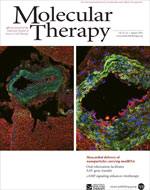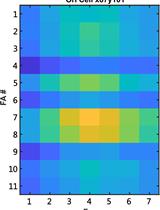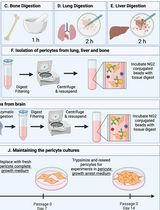- EN - English
- CN - 中文
In vitro Flow Adhesion Assay for Analyzing Shear-resistant Adhesion of Metastatic Cancer Cells to Endothelial Cells
体外流式粘附实验法分析转移癌细胞到内皮细胞的抗剪粘附性
发布: 2016年02月20日第6卷第4期 DOI: 10.21769/BioProtoc.1731 浏览次数: 14228
评审: Lee-Hwa TaiShannon RuppertAnonymous reviewer(s)
Abstract
Hematogenous metastasis is a primary cause of mortality from metastatic cancer. The shear-resistant adhesion of circulating tumor cells to the vascular endothelial cell surface under blood flow is an essential step in cell extravasation and further tissue invasion. This is similar to a process exploited by leukocytes for adhesion to inflamed blood vessels (leukocyte mimicry). The shear resistant adhesion is mediated by high affinity interactions between endothelial adhesion molecules and their counter receptor ligand expressed on circulating cells. Thus, weak interaction results in a rapid detachment of circulating cells from endothelium. Despite the critical role of vascular adhesion of cancer cells in hematogenous metastasis, our knowledge regarding this process has been limited due to the difficulty of mimicking dynamic flow conditions in vitro. In order to gain better insight into the shear-resistant adhesion of cancer cells to the endothelium, we developed a protocol for measuring the shear resistant adhesion of circulating tumor cells to endothelial cells under physiologic flow conditions by adapting a well established flow adhesion assay for inflammatory cells. This technique is useful to evaluate 1) the shear resistant adhesion competency of cancer cells and 2) the endothelial adhesion molecules necessary to support cancer cell adhesion (Kang et al., 2015).
Materials and Reagents
- Flow chamber: µ-Slide I 0.4 Luer (ibidi, catalog number: 80176 )

Figure 1. Flow chamber: µ-Slide I 0.4 Luer (modified the picture from www.ibidi.com) - Serial Connector for µ-Slides (ibidi, catalog number: 10830 )
- Syringe (10 ml, 30 ml)
- Silicone Tubing (0.8 mm ID) (ibidi, catalog number: 10841 )
- 50 ml tube with line connection (SARSTEDT AG & Co, catalog number: 60.596 )
- Y tube fitting (ibidi, catalog number: 10828 )
- Weight (SP Scienceware, Bel Art, catalog number: F183240000 )
- Hose clips (ibidi, catalog number: 10821 )
- Human microvascular endothelial cells (HMVEC) (Lonza, catalog number: CC2543 )
- Cancer cells
Cell line or primary cancer cells [e.g., human breast cancer cell line, MDA-MB-231 (ATCC, catalog number: CRM-HTB-26 )] - Endothelial basal medium-2 (Lonza, catalog number: CC-3156 )
- EGM SingleQuot Kit (Lonza, catalog number: CC-4133 )
- Dulbecco's Modification of Eagle's Medium (DMEM) (Thermo Fisher Scientific, Mediatech, Cellgro®, catalog number: 13-013 ) supplemented with 1% fetal bovine serum (FBS)
- Heat Inactivated Fetal Bovine Serum (FBS) (Life Technologies, catalog number: 10082-147 )
Note: Currently, it is “Thermo Fisher Scientific, GibcoTM, catalog number: 10082-147”. - Glutamax (Life Technologies, catalog number: 35050 )
Note: Currently, it is “Thermo Fisher Scientific, GibcoTM, catalog number: 35050 ”. - Antibiotic-antimycotic (Life Technologies, catalog number: 15240 )
Note: Currently, it is “Thermo Fisher Scientific, GibcoTM, catalog number: 15240 ”. - Collagen I, Rat Tail (Life Technologies, catalog number: A1048301 )
Note: Currently, it is “Thermo Fisher Scientific, GibcoTM, catalog number: A1048301”. - Fibronectin from human plasma (Sigma-Aldrich, catalog number: F0895 )
- Cell culture medium for HMVEC (see Recipes)
- Cell culture medium for Cancer cells (see Recipes)
Equipment
- Glass beaker (1,000 ml)
- Stir bar
- 37 °C, 5% CO2 cell culture incubator (NuAire, model: In-VitroCell ES NU-5800 )
- Cell culture centrifuge (Eppendorf, model: 5702 )
- Inverted Microscope with camera (Nikon, model: Eclipse TS100 )
- Camera (McCrone, model: MicroPublisher 3.3 RTV )
- KDS LegatoTM 200 syringe pump (KD Scientific)
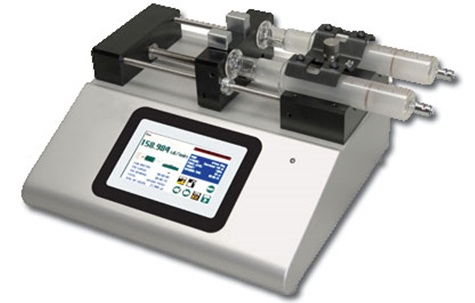
Figure 2. KDS LegatoTM 200 syringe pump (modified picture from http://www.kdscientific.com/products/pumps/Legato200.asp) - Ibidi Heating System [Ibidi Temperature Controller ©ibidimodel (ibidi, model: Version 3.3)]
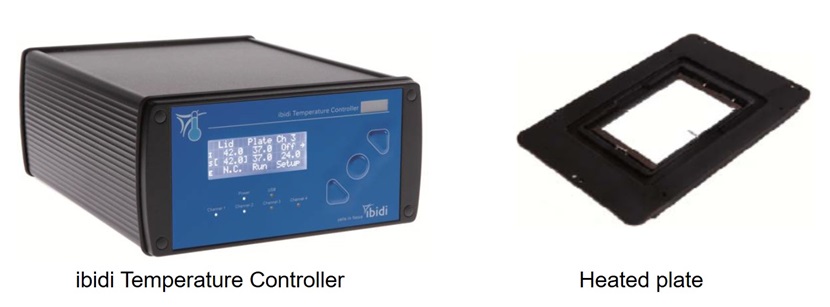
Figure 3. Ibidi Heating System (modified picture from http://ibidi.com/xtproducts/en/Instruments-Accessories/Heating-Incubation-Systems/ibidi-Heating-System-Universal-Fit) - Magnetic hot stir (Thermo Fisher Scientific, catalog number: 200-48SH)
- Thermometer (Thermo Fisher Scientific, catalog number: 13-201-695 )
- Level (Stanley Black & Decker, catalog number: 43-511)
Software
- Q-capture pro 7.0 (Qimaging)
Procedure
文章信息
版权信息
© 2016 The Authors; exclusive licensee Bio-protocol LLC.
如何引用
Kang, S., Bajana, S. and Tanaka, T. (2016). In vitro Flow Adhesion Assay for Analyzing Shear-resistant Adhesion of Metastatic Cancer Cells to Endothelial Cells. Bio-protocol 6(4): e1731. DOI: 10.21769/BioProtoc.1731.
分类
癌症生物学 > 侵袭和转移 > 细胞生物学试验 > 细胞粘附
您对这篇实验方法有问题吗?
在此处发布您的问题,我们将邀请本文作者来回答。同时,我们会将您的问题发布到Bio-protocol Exchange,以便寻求社区成员的帮助。
Share
Bluesky
X
Copy link


